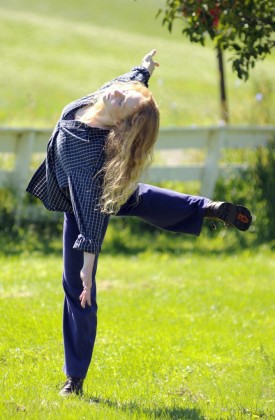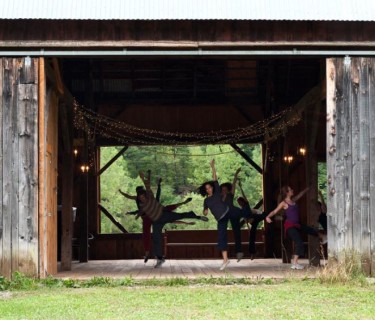How'd You Get There, Dancer Audrey Ellis?
by Noah Davis

Audrey Ellis grew up on a fruit farm in western New York dreaming of being a dancer. She moved to Brooklyn five years ago after graduating from Goucher College with a degree in dance and philosophy, and joined a dance company while also working as a freelance instructor. She enjoyed the cycle of performing and teaching, performing and teaching, but something was missing. Enter the farm. A few years back, Ellis and her friend Sarah Capua formed a dance company called A+S Works and decided to host a weekend-long dance festival on Ellis’ family’s land. The first event was a success, as was the second, and so the festival will have its third year this summer. I met Ellis recently in Bushwick and we talked about how the festival got started, the difficulties of the New York dance scene, and her day job teaching dance at a high school around the corner.
So how do you describe exactly what you do?
I’ve been in the city a little over five years. Initially, I was performing for a dance company — so dancing professionally — and doing some freelance teaching here and there. At a certain point, grad school fit in, but really I was just trying to perform and teach, perform and teach, perform and teach. Eventually, a good friend and collaborator of mine and I decided to really seriously do our own work. As we started to do make a work, the second question is always “Where do you show it?” or “Why are you making it?” We discovered we weren’t really interested in the New York dance scene.
Why not?
We couldn’t really find a rooted reason for showing work here. It seems like there are a lot of people showing really wonderful work for the same 50 people again and again and again and again. We were feeling like there needed to be a little bit more integration in how dance exists in our world.
I think the first step was really asking myself, “What is the biggest resource in my life right now?” I grew up on a farm in western New York state. I suddenly realized that the land that was just sitting there was a great resource. I started thinking about how I could use it to my benefit. Almost three years ago, we decided that we would start a festival. On the first weekend in August, we would invite our favorite artists from around the country. We would investigate the creative process, but it was also a meeting of minds to discuss what we were doing in our respective dance communities. We wanted to try to find a little bit more of a place for dance in our world, especially with the economic climate and the arts in general being so underfunded. You’re certainly not doing it for the money.
It turns out no one is doing anything for the money.
[Laughs] We’re all just getting by somehow.
Sarah and I formed the company, and we decided to put on the dance festival. We, jokingly, called it “A+S Works on the Farm.” We had the first year. It was incredible. The city sponsored a showing, and the challenge of the weekend was to make a full-length piece together in basically 24 hours. It wasn’t just that these artists were getting together to talk about their particular processes, but also to challenge ourselves to learn in action and really pull one 40-minute piece together in 24 hours to perform. It’s a festival about process, and most dance festivals are about product. They are about coming to a particular community and showing a work, which is great and we definitely want that to be a part of our festival, but what we’re finding is that this particular project is about process. Immediately, we realized how many levels that was happening on. It wasn’t just happening for the artists involved. It was happening in the community. The community was more interested in our process than they were in our product, and they wanted to be included in our rehearsals. We did all the rehearsing and creating on the farm grounds outside, like in the cornfields.
I saw a couple of the photos. They’re amazing.
Yeah. [Laughs] In year two, we expanded our scope in terms of working with the community and the number of people we invited. This year is a turning point year because we’re officially city-sponsored.
What city?
Hornell, New York. Not Cornell.
So, instead of a long weekend, it’s going to be an entire week of programing. There will be open classes. It’s dance-based, but more specifically, it’s dance-making-based. It’s not about dance classes. It’s about the actual process of making work for the community as well as for the artists who are there.
The really cool thing that we’ve found is that the artistic value of the work doesn’t become less sophisticated when you include the community. The dancers are finding innovative, clear, very sophisticated artistic voices when working with the community members who have very little exposure.
Is that because you are focusing on the process?
Yeah. It’s about authorship. People can author something in a way that expands the idea about what dance really is. People have very particular ideas about what dance is. It’s been fun.
We’re inviting many more artists this year, and we’re hoping to quadruple our budget. I’m involved in a lot dance education here in the city, so down the road we’re hoping for things like student exchanges from Brooklyn to upstate New York. We’d like to integrate the Brooklyn community as much as we’re engaged the Hornell community.

Did you always want to be a professional dancer when you were growing up?
I did. One thing that I think has helped me in my process here in New York is learning that that skillset can be used in a variety of ways. For awhile I was choreographing operas, and then I went into directing operas. I had never related to the art-form before, but I realized that the choreographer skills were directly relating to another art-form that was exciting and that I could bring a different perspective.
I’ve always been able to stay in my field, but what that means is very broad. For awhile, I was teaching babies sign language because I could pick up sign language really fast. Apparently, they look for dancers to do that because it’s all movement-based.
You went back to school to get your master’s. Was that in dance?
No, that was in philosophy. A very useful careers as well. [Laughs] But it actually has been very useful in the fact that I focus on aesthetics. It really helped me tune into a problem with the art world in New York. The art happens, and then it disappears. What you have to be able to do is reflect on it and put the actual work in a position to do something else in the community. I think the degree helped me in that regard.
I also started doing a lot of dance review and dance criticism for L Magazine, which has opened up my world of who we’re inviting to the farm event. It all kind of works together.
Can you talk a little bit about the teaching you’re doing?
I was freelancing for private dance studios, and also organizations like the YMCA who would outsource to different public schools. I was teaching for a private children’s ballet company that catered to celebrity parents and I was teaching in Bushwick. The most opposite ends of the spectrum. Just this year, I was offered a full-time teaching position so I’m teaching a high school there.
You’re teaching dance full-time? That’s a amazing they have the funding.
It’s very rare. It’s going well. When I first started teaching, everyone said the first year of teaching would be the worst year of my life. I don’t quite feel like it’s been that bad. I really felt like I was familiar with the demographic. I didn’t feel disconnected from what the experience was going to be. I think a lot of people aren’t prepared.
But it’s tough. I just wish I could do more teaching of behavior and less managing to the environment. If I was teaching the whole time, it would be great.
Where do you go from here? Is the summer event something that could turn into a more full-time job?
I am hoping. This is year three, so it’s still very early in terms of nailing down major grants for something like this, but the town I grew up in is a very depressed area and it’s becoming more and more depressed. There’s a possibility that they’ll cut all of their programming in their public schools so there won’t even be a music class. I’d love for the festival to be something that’s a destination and a moment of economic growth for the small town.
There’s an opera company in a small town in western New York that is well known and highly regarded. I’m not going to stay that my festival is going to be a world-renowned dance festival.
No, but there’s a model there.
I think there’s a need for artists in urban areas to leave and come back. And I think there’s a need for these small towns to not just be exports for artists. We have these people who grow up in small towns and want to engage in arts, so they move to big cities. We need a little bit of import.
There’s also the death of the small farm, and I like that the space can provide a different type of nourishment. There are parallels between the small farm and the dance world in the fact that people are finding ways to connect and matter.
It all comes full circle. Who should I talk to next?
I have a good one. Christopher Hollowell. He’s a vegan donut-maker. And he just opened his shop on Bushwick and Montrose. It was just named best donut in New York City by the Daily News. And he’s my roommate, so I can tell him to answer your emails.
Previously: Brad Reedy, Wilderness Therapist
Noah Davis is frequently lost. Top photo by Lynn Brennan; bottom photo by Nils Orth from a+s works on the farm 2011.
